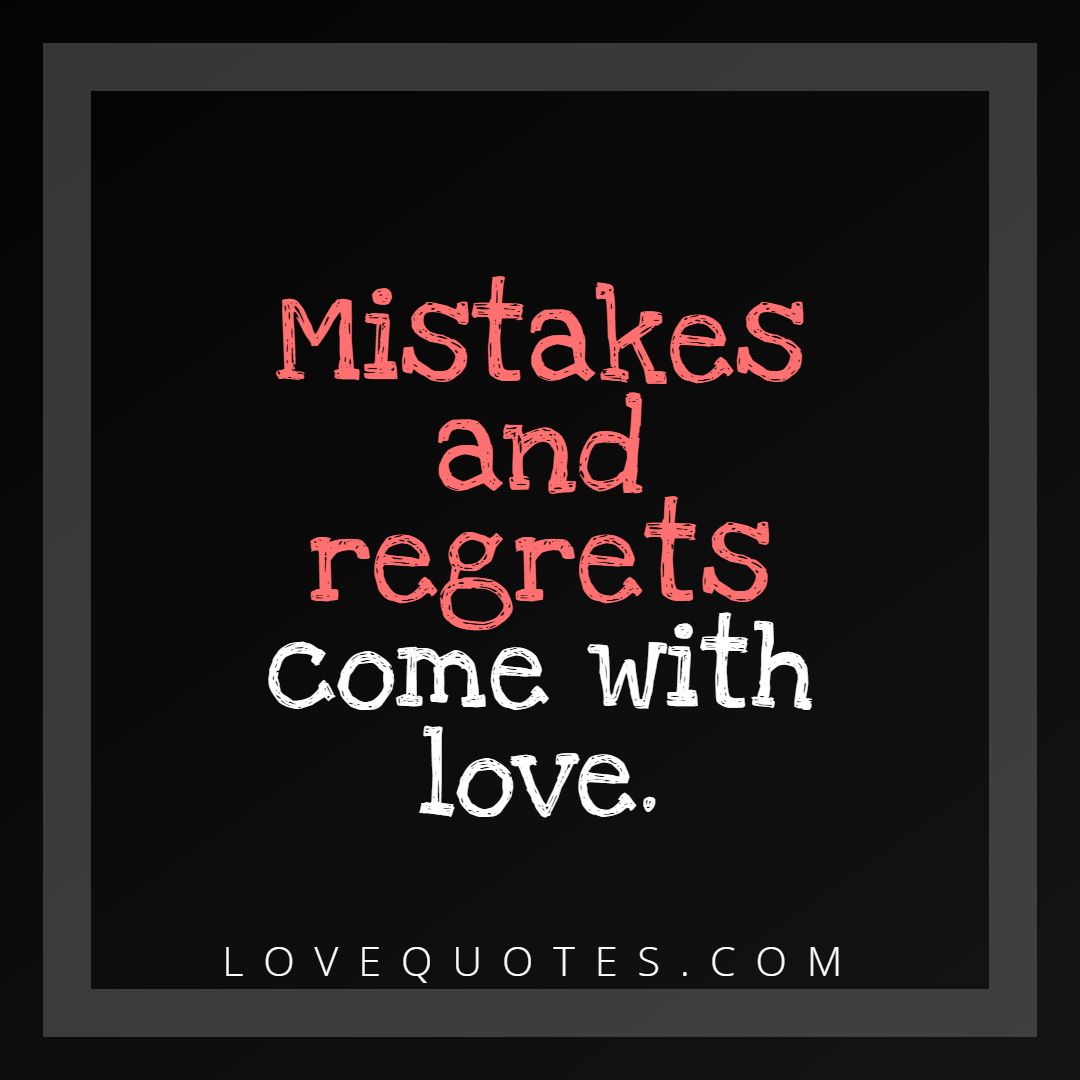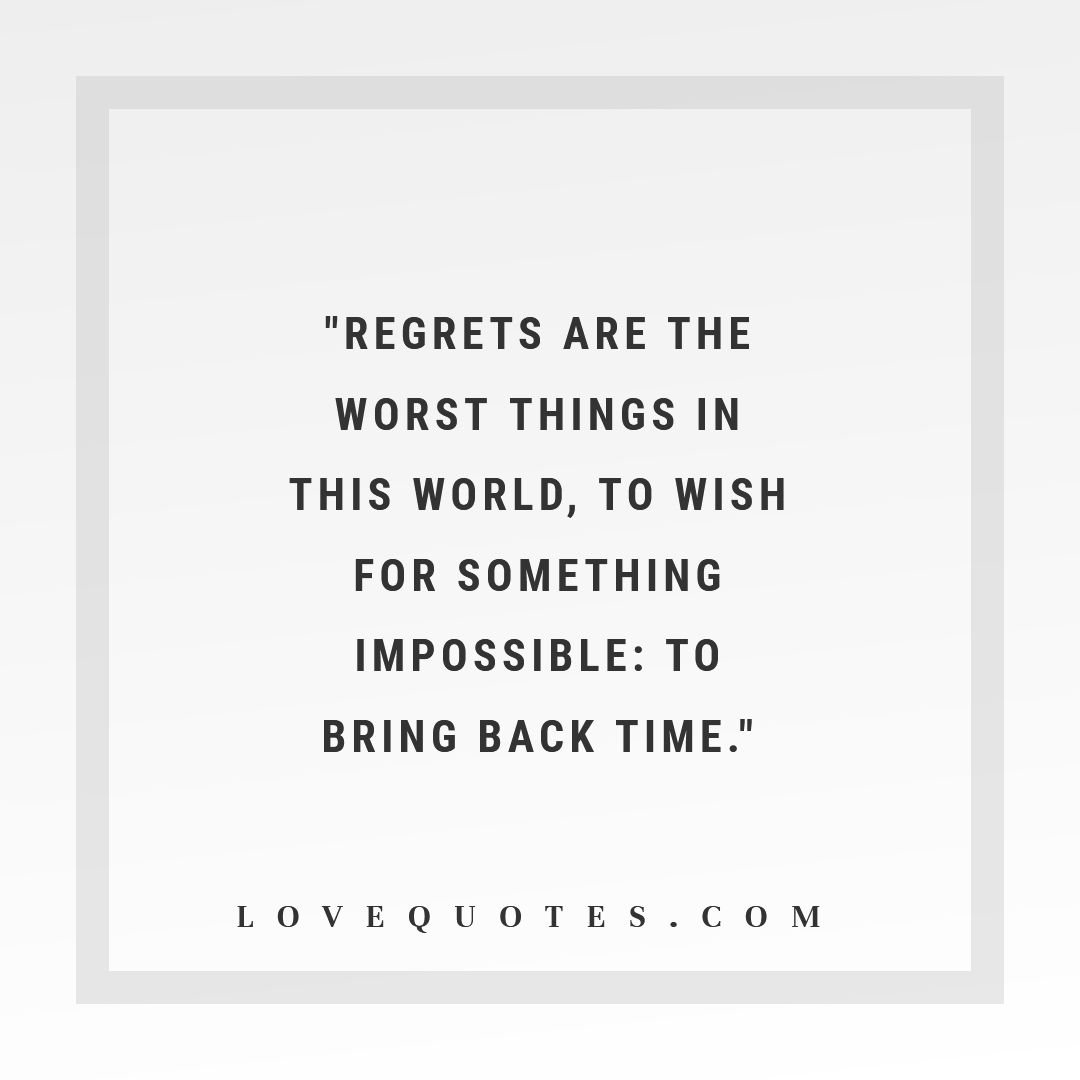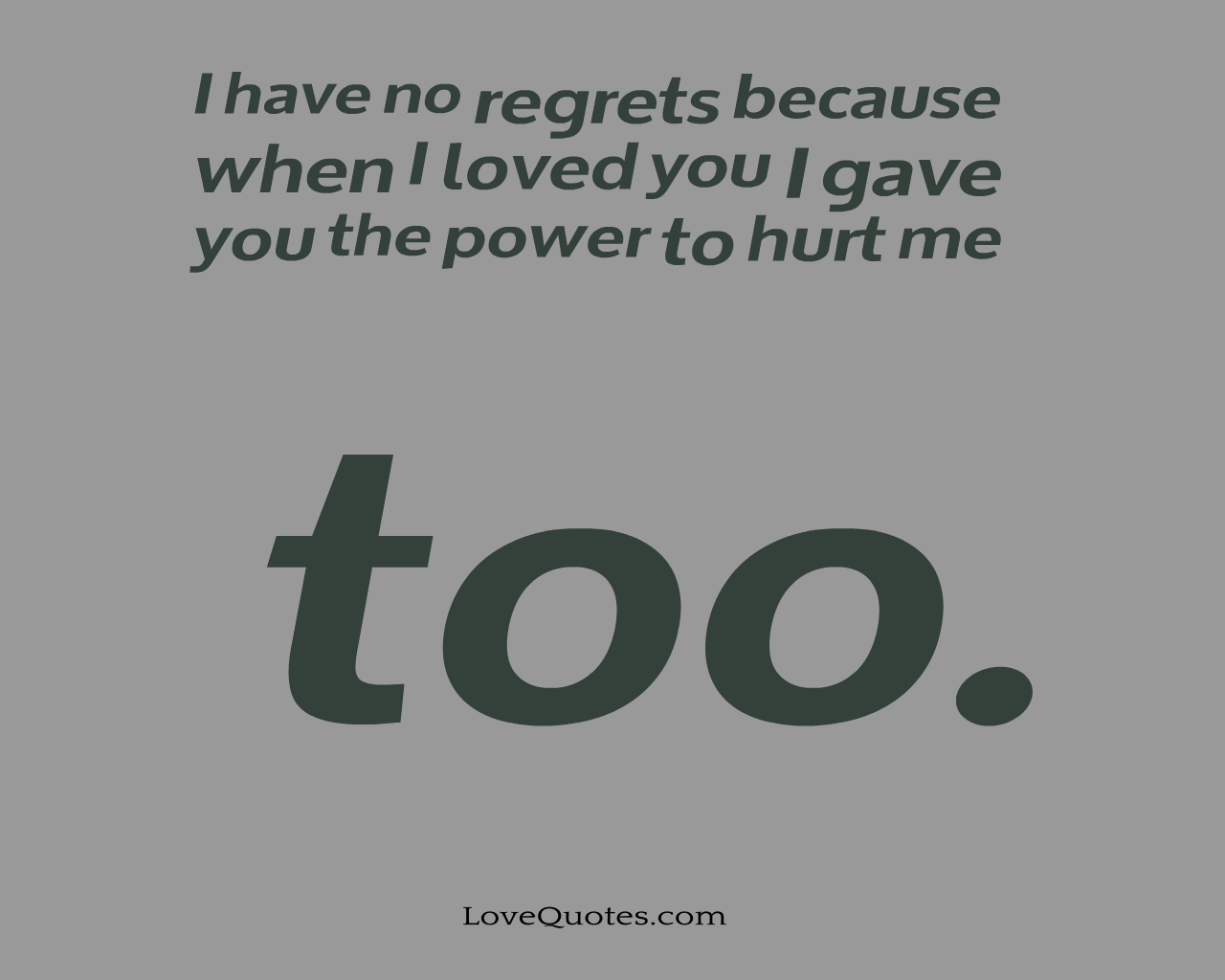Regrets In Love Quotes: Finding Peace After Heart's Choices
Have you ever looked back at a past relationship, perhaps a long time ago or maybe just last week, and felt a familiar ache? That feeling, that heavy weight in your chest, is often what we call regret. It’s a powerful human experience, one that can linger like a quiet echo, especially when it comes to matters of the heart. Today, we’re going to talk about this very real emotion and how understanding it, through the lens of regrets in love quotes, might just help us feel a little lighter.
Regret, you know, implies pain. My text tells us it comes from deep disappointment, a longing that didn't go anywhere, or perhaps a remorse that just won't fade. It’s that moment when you think, "I deeply regret what I said," or "I wish I had done things differently." It’s a feeling tied to choices we made, or choices we didn't make, and the sense that we had some control, but maybe, just maybe, we failed in some way.
Sometimes, regret is fleeting, a quick pang that passes. Other times, it stays with you, a constant companion. But what if we could learn from it? What if these feelings, as my text suggests, have something important to teach us? We'll explore this and more, looking at how quotes about love and regret can offer comfort and a path forward, so you can, like your, start working on some of these feelings today.
Table of Contents
- Understanding Regret in Love
- The Pain of What Might Have Been
- Types of Love Regrets and What They Reveal
- Quotes That Speak to Our Hearts
- Moving Past Regret in Love
- Common Questions About Regret in Love
Understanding Regret in Love
Regret, in a way, is a very human emotion. My text points out that it comes from believing something bad happened because of our own choices. It’s tied to that sense of agency, the feeling that we had control, and we didn't quite get it right. We feel bad, you know, because we did something or didn't do something we think we should have, or shouldn't have.
When we talk about regrets in love quotes, we're really talking about a deep emotional space. It's about those moments in relationships where we wish we could rewind time. Maybe we wish we had spoken up, or perhaps stayed quiet. Maybe we wish we had tried harder, or maybe, just maybe, let go sooner. These feelings are, in fact, quite common.
Research, my text mentions, points to life's most common regrets. And, apparently, it even suggests ways to avoid enduring regret. This gives us hope, doesn't it? It tells us that while regret can be incredibly painful, it's not something we have to live with forever. We can, in some respects, learn to move through it.
The Pain of What Might Have Been
The heart of regret in love often lies in what could have been. It's the ghost of a different path, a different outcome. My text says regret implies pain caused by deep disappointment. This disappointment, you see, can sting quite a bit, especially when it's about someone we cared for deeply.
Fruitless Longing and Unavailing Remorse
Sometimes, we feel a fruitless longing. This means we wish for something that just can't happen now. Maybe a relationship ended, and we long for it to be different, but it's not possible. My text also mentions unavailing remorse. This is that feeling of sorrow for something that happened, but where the sorrow itself doesn't change the past. It’s a bit like wishing for rain in a desert after the crops have withered; the wish is there, but it won't bring them back.
This kind of regret can be a heavy burden, can't it? It keeps us tied to what was, instead of looking at what is. It’s about the "if onlys" and the "what ifs." You know, like, "If only I had told them how I felt," or "What if I hadn't pushed them away?" These thoughts can, in fact, keep us stuck in a cycle of sadness.
The Burden of Choice
Regret is what we feel when we believe something bad happened because of our own choices, my text says. This means we carry the weight of our decisions. We feel bad because we did or didn't do something we believe we should or shouldn't have done. It’s tied to agency, that sense that we had control, and we failed. This can be a tough pill to swallow, you know.
Think about it: "Don't say anything you might regret later," is a common piece of advice. This shows us that we are aware of the power of our words and actions. When we look back and say, "I deeply regret what I said," we're acknowledging that power. It's a reminder that our choices, even small ones, can have lasting effects, and that's just a little something to consider.
Types of Love Regrets and What They Reveal
My text refers to research by Pink, who talks about four types of regrets. These types, he says, reveal what humans truly value. They have something to teach us, too it's almost like a lesson written in our feelings. When it comes to love, these types of regrets can show us what we truly needed or missed.
Connection Regrets: The Need for Love
One of the types Pink mentions is connection regrets. And with connection regrets, my text says, the human need is love. This makes a lot of sense, doesn't it? Many of our deepest regrets in love come from a lost connection, a bond that broke, or a relationship that never quite blossomed. We regret not reaching out, not being there, or perhaps letting someone important drift away.
These regrets often feel the most personal, you know. They touch on our desire for closeness, for belonging, for that deep human bond. It’s about the people we shared our lives with, or almost shared our lives with. These feelings can, in fact, teach us about the importance of nurturing our relationships and cherishing those around us.
Moral and Foundation Regrets in Relationships
While connection regrets are directly about love, moral and foundation regrets can also show up in our relationships. My text says, with moral regrets, the need is goodness. This might mean regretting a time we weren't kind enough, or perhaps we acted in a way that didn't align with our own values in a relationship. It's about those moments where we feel we let ourselves, or someone else, down morally.
Then there are foundation regrets, where the need is stability. In love, this could mean regretting not building a stronger base for a relationship, or perhaps not setting healthy boundaries. It could be about choices that undermined the stability of a partnership. These kinds of regrets, you know, can highlight where we might need to focus our energy in future relationships to build something lasting.
Quotes That Speak to Our Hearts
When we feel the weight of regret, sometimes hearing someone else put words to it can be a comfort. This is where regrets in love quotes come in. They offer a mirror to our own feelings, letting us know we're not alone. My text talks about regret as an incredibly painful emotion, rooted in feelings of contrition, disappointment, guilt, or remorse. These quotes often capture just that.
Consider words that speak of lost chances: "The saddest thing about love is that not only do you regret the mistakes you made, but also the good things you didn't do." Or perhaps quotes about the pain of letting go: "It's hard to regret something that once made you happy, but it's harder to live with the regret of not trying to keep it." These words, you know, resonate because they touch on universal experiences.
Some quotes highlight the wisdom gained: "I don't regret loving you, I regret the pain I allowed myself to go through for you." This kind of quote, you know, shifts the focus from the act of loving to the lessons learned. They can, in some respects, help us see our past not just as a source of pain, but as a teacher.
Then there are quotes that speak to the quiet remorse of words unspoken: "Of all the words of tongue or pen, the saddest are these: 'It might have been!'" This one, you know, captures that fruitless longing my text talks about. It's about the opportunities we let slip by, the conversations we never had. They remind us, perhaps, to be a little braver next time.
Moving Past Regret in Love
So, if regret can be so painful, how do we move beyond it? My text suggests ways to stop living with regret. It points out that regret often stems from the inability to cope with things. This means that learning to cope is a big part of finding peace. It’s not about erasing the past, but about changing our relationship with it.
Acknowledging the Pain
The first step, really, is to acknowledge the feelings. Regret can be an incredibly painful emotion, my text states. It's okay to feel that pain. Suppressing it often makes it stronger. Give yourself permission to feel the disappointment, the guilt, or the remorse. This is, you know, a very important part of the healing process.
Sometimes, just saying "I deeply regret what I said" to yourself, or to someone else if appropriate, can be a release. It's about owning the feeling, not letting it own you. It's about recognizing that you believe something bad happened because of your choices, and that feeling is valid. This honest look can, in fact, be quite freeing.
Learning from the Past
My text says that Pink uses the example of photographic negatives to explain how each type of regret has something to teach us. Just like a negative holds the image that can be developed, our regrets hold lessons. They show us what we value, what we need, and where we can grow. This is, you know, a powerful way to look at something that feels bad.
Ask yourself: What did this regret teach me about love? About myself? About what I need in a relationship? If a regret stems from a connection that broke, it might teach you about the importance of communication, or perhaps setting boundaries. If it’s about a moral choice, it could reinforce your values. These lessons are, in some respects, gifts in disguise.
Finding Peace Today
My text mentions that research points to ways to avoid enduring regret. One key is to understand that regret is related to perceived opportunity. When we feel regret, we often see a missed chance. But what if we focus on the opportunities we have right now? We can, in fact, choose to act differently today.
Think about the phrase, "She does not regret leaving." This shows that moving forward, making new choices, can lead to a place of no regrets. It’s about accepting that some things worked out the way they did, and choosing to build a better future. It's about, you know, finding ways to cope with the past so it doesn't define your present. For more on coping with emotions, you might want to look at a trusted psychology resource like Psychology Today.
It’s time now, isn't it, to start working on some of these feelings? Whether it's through self-reflection, seeking support, or simply acknowledging your past, the path to peace is there. Remember, regret is what we feel when we believe something bad happened because of our own choices, and you have the power to make new choices today.
Common Questions About Regret in Love
Many people wonder about the depth and nature of regret in love. Here are some common thoughts and questions that often come up when we talk about this topic, you know.
What is the deepest regret in love?
The deepest regret in love often involves a lost connection or an unspoken truth. It's that feeling of fruitless longing, as my text puts it, for a love that could have been, or for a bond that was broken due to actions or inactions. It’s about the sense that we had control, and we failed to nurture something precious, or perhaps failed to be true to ourselves.
How do you deal with regret in a relationship?
Dealing with regret means acknowledging the pain and learning from it. My text mentions that regret often stems from an inability to cope. So, learning coping strategies is key. This could involve self-reflection, understanding what the regret teaches you about your values, and then making new choices today that align with those lessons. It’s about accepting what happened and moving forward with new wisdom, too it's almost like a fresh start.
Can you truly regret loving someone?
While it's rare to regret the act of loving itself, people often regret the circumstances, choices, or pain associated with that love. As my text says, regret is tied to agency. So, you might regret how you acted, or how someone treated you, or the opportunities missed, rather than the feeling of love itself. It's more about the journey and its bumps, you know, than the destination of caring for another person.

Mistakes And Regrets - Love Quotes

Regrets Are The Worst - Love Quotes

I Have No Regrets - Love Quotes